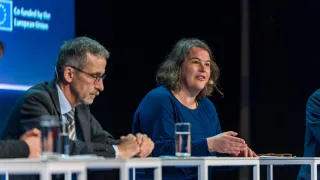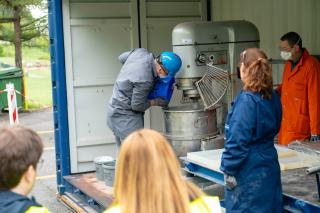Op-ed: Why We Need a Strong Strategy From Mine to Mill for the Steel Industry
Op-ed: Why We Need a Strong Strategy From Mine to Mill for the Steel Industry

By Judith Kirton-Darling, Deputy General Secretary of industriAll Europe
Steel-making is one of the most important industries in Europe, closely linked to downstream sectors like automotive, construction, and renewable energy. However, the industry faces significant challenges—rising energy prices, soaring production costs, and fierce global competition. These pressures have led to lower-than-expected consumption of European steel, threatening the sector at a time when Europe is also pushing forward with ambitious plans for low-carbon steel production to meet climate targets.
Growing up on Teesside in north-east England with deep roots in both the steel and petrochemical industries, I’ve seen firsthand the consequences of losing the first links in the industrial chain. When steel production capacity disappears, there is an increased risk that the rest of the chain follows, including the finished products. Expertise and know-how are also not static—they will shift elsewhere in the world.
The danger is clear: without a unified industrial strategy, Europe risks losing its steel capacity, autonomy, and strategic sovereignty. This would be disastrous, especially when we need this industry for climate goals, defence, and securing global supply chains, lessons made painfully clear during the pandemic.
Protecting Jobs While Decarbonising
Representing 300,000 steelworkers across Europe within IndustriAll Europe’s membership, I’ve met the real people and communities that depend on this sector, many of which have for generations. As we work to decarbonise the steel industry, we must ensure we’re not de-industrialising parts of Europe in the process. If mass de-industrialisation takes place in Europe, the political and social fallout will be immense. In five years, we could face a much more hostile political landscape if we fail to protect jobs and industries today.
That’s why IndustriAll Europe has long called for a European Industrial Deal and a European Steel Action Plan. Why we signed the Antwerp Declaration and why we have mobilized our members for European action days since 2000. We need a coordinated, pan-European industrial strategy—one that goes from mining raw materials to delivering future-ready products—and does so sustainably.
Immediate Actions Needed
In the short term, we already have tools at our disposal that are not being used assertively enough. Public procurement, for example, could create lead markets for green steel made in Europe. While this only represents a small portion of production today, it could drive demand.
National industrial policies must work hand in hand with Europe-wide actions. No member state can do this alone. Even a great national strategy will be undermined if we don’t establish an international level playing field, using and developing our EU trade instruments effectively. We need this orchestra to play in harmony, not in discordant noise. A fragmented, piecemeal approach is something we cannot afford—if we continue down this path, we’ll end up with a broken, fragmented industry.
Energy reform is another crucial element. The European Commission’s missed opportunity to deeply reform the electricity market was a setback, and this must be addressed urgently. Without abundant and affordable, clean energy, decarbonizing steel production will remain out of reach.
We also need significant investments. I’ve seen promising progress in places like Northern Sweden, where large-scale investments in decarbonized steel production are already underway. But private investment alone is not enough. We need public-private cooperation, and where public funds are involved, there must be a return for the taxpayers.
This is why, as trade unions, we demand that any public support come with strong social and environmental conditions, ensuring the benefits of this transformation are widely shared. The steel industry has a long history of strong social partnerships, which have been the foundation of our success for decades. This tradition of negotiation and dialogue must continue as we navigate the radical transformation ahead.
In conclusion, we need a comprehensive mine to mill industrial strategy that unites all stakeholders and ensures everyone is at the table. Only through collective action can we transform the entire industrial value chain and achieve net-zero by 2050. We must do this as a unified European continent, crossing the finish line together.
Judith Kirton-Darling is the general secretary of IndustriAll Europe, a federation of European trade unions across supply chains in manufacturing, mining and energy sectors. She spoke at the Raw Materials Summit 2024 in Brussels.
The Raw Materials Summit 2024 was organised by EIT RawMaterials, the world's largest network in the raw materials sector. The next Summit will take place on 13-15 May 2025, where responsible sourcing will be further explored. www.rmsummit.com


